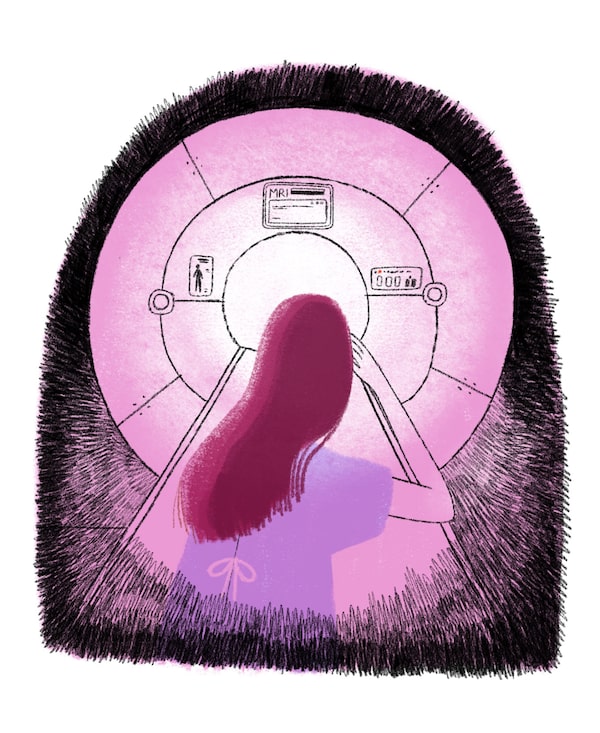First Person is a daily personal piece submitted by readers. Have a story to tell? See our guidelines at tgam.ca/essayguide.

Illustration by Chelsea O'Byrne
The thudding, chugging, grinding sounds are so loud they make my head hurt, despite the ear protection that Rose, the technician, had put awkwardly over my ears. And that was after apologizing profusely for having to poke me four times to find my vein for the IV. Rose also gave me a button to press before she slid me into the smooth white tube, “if there’s an emergency.”
The button is right under my thumb. I wonder if the black terrified feeling spreading in my belly constitutes an emergency? The handout of detailed instructions had said to tell the technician if you were claustrophobic, but I hadn’t said anything because, up until now, I hadn’t thought I was. Then when Rose slid me in, face down, arms tight against my side, breasts slotted neatly through the holes made just for them, I thought: “Wait! Maybe I am claustrophobic!”
The incredibly loud noises fade for a few seconds, but I know it isn’t over because Rose had said it would take up to 20 minutes and that halfway through, she’d put some kind of dye into my IV that would drain into my veins so they could take different kinds of pictures of my breasts. An earlier biopsy had shown that the left breast was harbouring invasive lobular carcinoma – a series of words that I don’t think I’ve heard once in my 47 years and am now saying on a regular basis.
Under the panic is surprise and shock. Is this really me in an MRI machine? With cancer? It seems I have spent much of my life surprised that things could actually happen to me. People warned me – you could get pregnant, you could end up with an abusive partner, you could get frostbite – I haven’t had frostbite, but they were right about the other two. I could, and did, get pregnant. It took an abortion to get it through my head that I wasn’t somehow immune to sperm. I also had an abusive partner. That one was a slow simmering, like the proverbial frog in a pot, little mean comments, a pinch, hands around my neck. Shock. Is this really happening?
The MRI resumes thudding, followed by an undulating high-pitch squeal. The panic rises up again, panic at the sounds, the confinement, the tumors in my breast. This is a form of torture, my arms pinned. I’ll tell all my secrets if I can just get this to stop. I take some slow deep breaths (something I never believed would calm me, but does, because I am, in the end, a human body that is soothed by the slow passage of air through my lungs). The panic subsides, but the shock remains. Outside this tube I am a mother, the lynchpin of a family, a family held together with chewing gum and twine, hope and tenacity. I have long-legged twin boys from that abusive relationship and a third child with my current husband. I can’t leave them. They need me. Rose told me not to move – “not a muscle or we’ll have to do it again” – but does a tear count?
When it’s finally over, Rose slides me out of a machine like a pizza from a stone oven. The buzzing in my head doesn’t stop, it’s as if the machine is still on, still reverberating in my ears. Rose helps me up and hurries me out of the room. “Sometimes you’ll pee blue after the injection. Don’t worry, it’s perfectly normal.”
In the changing room, my clothes are unfamiliar like I’m putting on some other person’s worn-out T-shirt and elastic-waisted pants. But of course, they are mine. This is all mine, the cancer, the children, the husband waiting out in the waiting room.
When I was pregnant, I would often dream that the baby was being gestated in someone else or in some sort of incubator. I would wake from these dreams comforted and then reach down to my swelling stomach and feel a horror that my body was doing this thing, growing this person, without any help. Now it’s growing something else, all on its own.
My husband found the lump. He was squeezing my breast, enjoying its softness when his squeezes went from amorous to clinical, from excited to worried. I didn’t believe anything was wrong and since lobular cancer is actually many lumps it was difficult to feel. But at his insistence, I went to the doctor and was swept into this river of appointments, tests and decisions.
Not really believing that things can happen to you means you’re dreadfully unprepared when they do. You sit stunned like a wounded deer in the ditch. Where did that car come from? But eventually, the shock fades and you have to get up, scared, but glad to be alive.
Coming out to my husband in the waiting room, I feel brand new. His eyebrows are knitted with worry. We hug and there’s a special tone to it, like a clear sweet bell. The buzzing in my ears finally fades. When we get home the twins squabble over who has to unload the dishwasher. My youngest clambers onto my lap, his small body leaning against my breasts. I kiss the downy hair on his neck. It’s the softest thing my lips have ever touched. The sun is setting, and we are together in this pinkish glow.
Natasha Nunn lives in Parkland County, Alta.